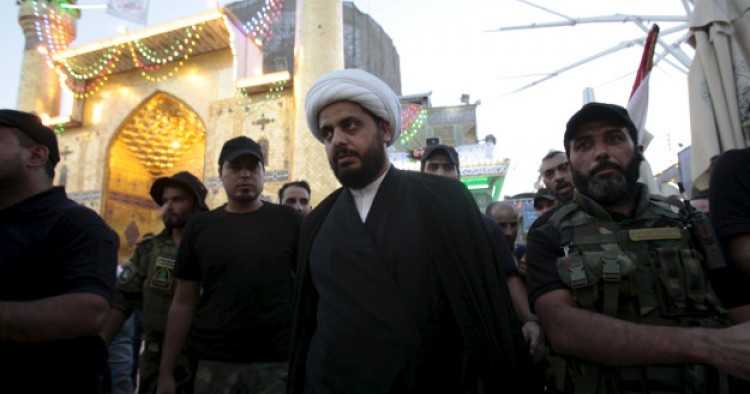Qais al-Khazali, the secretary-general of Iraq’s Asaib ahl al-Haq armed group, has accused the United States, Israel, Saudi Arabia and Turkey of supporting the Islamic State in Iraq and the broader region, according to Iran’s Fars News Agency. “The heroic forces of Hashd al-Shaabi [Popular Mobilization Forces] easily chop the heads of these forces,” he said while describing the Islamic State as the “special forces” of the United States and its allies. “Until the Hashd al-Shaabi forces exist, Daesh [Islamic State] cannot do anything,” he added. Speaking at a ceremony commemorating the late prominent Shiite leader Grand Ayatollah Mohammad Mohammad Sadeq al-Sadr, Khazali cautioned that “enemies are seeking to create a gap within our ranks” and called for vigilance and unity. He praised the “innovative plan” by Muqtada al-Sadr, the current leader of the al-Sadr movement, to reach out to all Iraqis for national unity.
Comment: Asaib Ahl al-Haq – or the League of the Righteous – is an Iraqi Shiite militant group fighting in Iraq and Syria. The group is funded by the Iran and reportedly has more than 10,000 fighters. According to the U.S. government accounts, the Lebanese Hezbollah upon a request by the Iranian government helped form and train AAH in 2005 to carry out attacks against the U.S.-led coalition forces in Iraq. AAH started as a splinter group of the Mahdi Army, the powerful Shiite Iraqi paramilitary force led by Muqtada al-Sadr. AAH has been accused of killing American soldiers and committing human rights abuses against Iraqi Sunnis.
Khazali has reportedly pledged allegiance to Iran’s Supreme Leader Ali Khamenei, and his group takes orders from I.R.G.C. Quds Force Commander Qassem Soleimani, rather than the government in Baghdad. This is despite the fact that AAH is part of the Popular Mobilization Forces (P.M.F.), which has been incorporated into the Iraqi security forces.
Khazali was arrested by the U.S. military in 2007 for his alleged role in high-profile attack in Karbala that had killed five American service members. But he was released two years later along with other AAH members – apparently in an exchange for a British hostage. The U.S. and British government denied it was a prisoner exchange.
Although AAH and U.S.-backed Iraqi security forces have recently been fighting against the Islamic State together, Khazali’s anti-American sentiment has not diminished. Last year, he hinted that his fighters could blend in with Iraqi troops to kill American advisers in Mosul. And as the Islamic State – the common foe – is on the brink of defeat in Iraq and Syria, Iran-controlled militant groups such as AAH and Harkat al-Nujaba have already dialed up anti-American propaganda and are pressuring the Baghdad government not to allow American troops to stay in Iraq for a long term.
In April, Khazali accused the United States, Turkey and Saudi Arabia of destabilizing Iraq at a speech to Iraqi college students. But when a poet accompanying him began praising Soleimani, the students protested with chants of “Iran out! Iran out!”
Khazali’s call for unity in Iraq also runs counter to his previous speeches and actions. In May, he said that his organization aims to establish a “Shiite full moon” not a “Shiite crescent.” In a video published in the Arab media, Khazali added that an alliance of Shiite forces across the region would be ready to achieve that goal by the time the hidden Shiite Imam Mahdi reappears. He noted that the Shiite force will include the Islamic Revolution Guards Corps (I.R.G.C.) in Iran, the Lebanese Hezbollah, the Houthi movement in Yemen, the Popular Mobilization Forces (P.M.F) and other Shiite militant groups operating in Syria and Iraq.
The Middle East Institute (MEI) is an independent, non-partisan, non-for-profit, educational organization. It does not engage in advocacy and its scholars’ opinions are their own. MEI welcomes financial donations, but retains sole editorial control over its work and its publications reflect only the authors’ views. For a listing of MEI donors, please click here.













